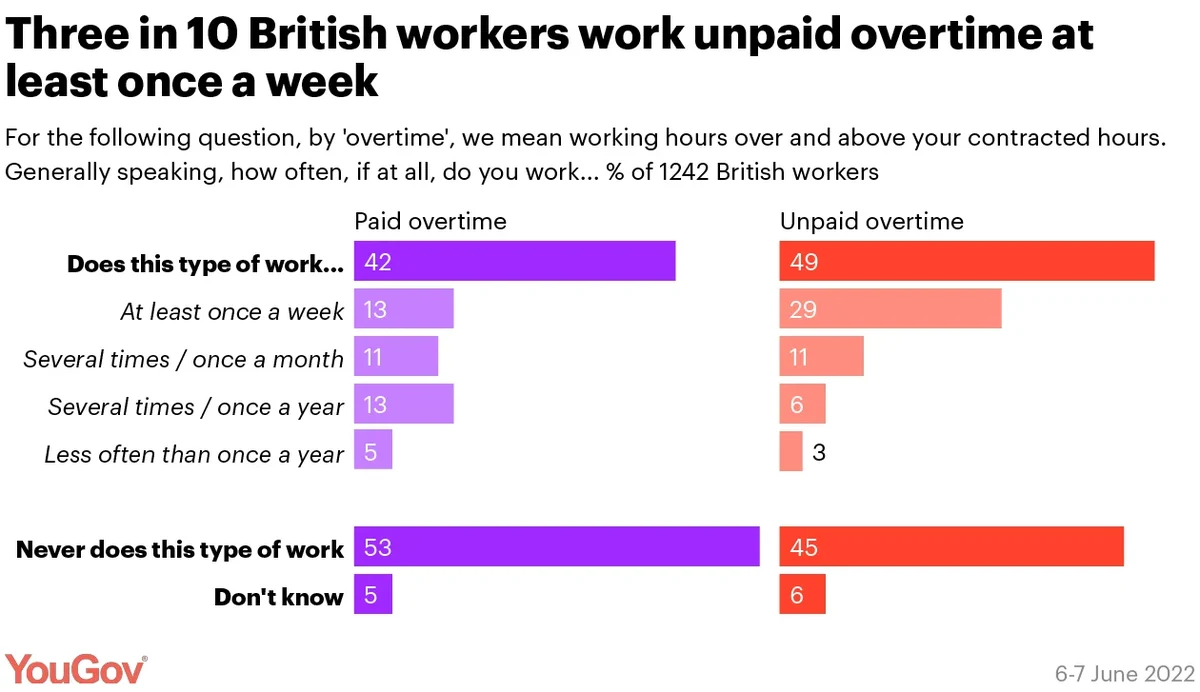More than half say their friends and family have asked them to cut back on hours, and a third say their work negatively impacts their outside lives
A stressful workplace can make you unwell, and stress at work can easily creep into impacting life outside of work. Health and Safety Executive statistics show that work-related stress, depression or anxiety represented 50% of all work-related illness in 2020-21, with incidences rising significantly over the last 20 years.
YouGov research shows half of workers in Britain (52%) say they feel “very” or “fairly” stressed at work. A further 36% say they do not feel very stressed, with just 10% saying they don’t feel stressed at all while working.
Almost four in ten workers (39%) also say they feel stressed when they think about work outside of work hours. Three in 10 (31%) say they feel very or fairly stressed even when they’re not working and not thinking about work.
Between 53% and 58% of workers in the under-60 age groups say they feel stressed at work, compared to just 34% of workers in the 60+ age group. Workers under 30 are most likely to report feeling stressed when thinking about work outside of work hours (47%) compared to just 23% of workers aged 60 and older.
And while 35% of workers under 30 say they feel stressed outside of work, compared to 21% of workers in their 60s and older, this difference (14 points) is less stark.
How does work life impact life outside of work?
Half of workers (50%) say they spend a lot of time, or a fair amount of time, thinking about work outside of working hours, with 47% saying they spend not much or no time at all. Overall, nearly nine in 10 workers (88%) say they think about work outside of working hours.
Britons with stressful jobs also tend to have work on their mind a lot more than those who feel relaxed at their workplace. Two-thirds of those who say they feel stressed at work (66%) spend a lot or a fair amount of time thinking about their job outside of working hours, compared to a third (34%) of those who say they don’t feel stressed.
On the question of whether work life has a positive or negative impact (or no impact at all), workers are split. A third (33%) say their work life has a negative impact on their life outside of work, while a further third (34%) say a positive impact and 26% say it has no impact at all.
Part-time workers (working up to 29 hours a week) are more likely than full-time workers to say their work life has a positive impact on their lives outside of work, by 45% to 30%, while full-timers are more likely than part-timers to say their work negatively impacts their life, by 36% to 23%.
Do Britons work too much?
More workers in Britain work unpaid overtime (49%) than work paid overtime (42%).
Three in 10 (29%) say they work unpaid overtime at least once a week, including one in nine (11%) who say they work unpaid overtime every working day. Paid overtime is less frequent – 13% say they work paid overtime at least once a week.

More than half of workers (56%) say their friends and family have asked them to cut back on how much they work, including one in five (20%) who say this happens very or fairly frequently. Four in 10 workers (41%) say they have never been asked by loved ones to cut back on their hours.
Workers in ABC1 households are more likely than those in C2DE households to say that their family and friends have asked them to cut back on work, by 61% to 48%.
See full results here










